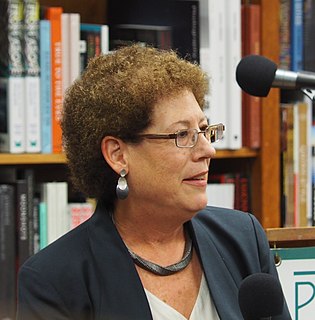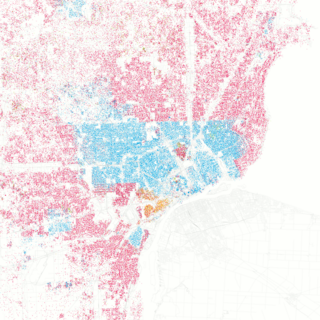William Julius Wilson is an American sociologist. He is a professor at Harvard University and author of works on urban sociology, race and class issues. Laureate of the National Medal of Science, he served as the 80th President of the American Sociological Association, was a member of numerous national boards and commissions. He identified the importance of neighborhood effects and demonstrated how limited employment opportunities and weakened institutional resources exacerbated poverty within American inner-city neighborhoods.
Detroit, the largest city in the state of Michigan, was settled in 1701 by French colonists. It is the first European settlement above tidewater in North America. Founded as a New France fur trading post, it began to expand during the 19th century with American settlement around the Great Lakes. By 1920, based on the booming auto industry and immigration, it became a world-class industrial powerhouse and the fourth-largest city in the United States. It held that standing through the mid-20th century.

Lizabeth Cohen is the current Howard Mumford Jones Professor of American Studies in the History Department at Harvard University, as well as a Harvard University Distinguished Service Professor. From 2011-2018 she served as the Dean of Harvard's Radcliffe Institute for Advanced Study. Currently, she teaches courses in 20th-century America, with a focus on urbanism, the built environment, and public history. She has also served as the Chair of the History Department at Harvard, director of the undergraduate program in history, and director of the Charles Warren Center for Studies in American History, among other administrative duties.
Conant Gardens is a historically Black neighborhood in northeast Detroit, Michigan. The neighborhood was once the most exclusive Black neighborhood in that city, and residents of Conant Gardens comprised the most highly educated Black enclave in Detroit.

Robert Sean Wilentz is the George Henry Davis 1886 Professor of American History at Princeton University, where he has taught since 1979. His primary research interests include U.S. social and political history in the nineteenth and twentieth centuries. He has written numerous award-winning books and articles including, most notably, The Rise of American Democracy: Jefferson to Lincoln, which was awarded the Bancroft Prize and was a finalist for the Pulitzer Prize.
The 1943Detroit race riot took place in Detroit, Michigan, of the United States, from the evening of June 20 through to the early morning of June 22. It occurred in a period of dramatic population increase and social tensions associated with the military buildup of U.S. participation in World War II, as Detroit's automotive industry was converted to the war effort. Existing social tensions and housing shortages were exacerbated by racist feelings about the arrival of nearly 400,000 migrants, both African-American and White Southerners, from the Southeastern United States between 1941 and 1943. The new migrants competed for space and jobs, as well as against European immigrants and their descendants.
The Labor and Working-Class History Association (LAWCHA) is a non-profit association of academics, educators, students, and labor movement and other activists that promotes research into and publication of materials on the history of the labor movement in North and South America. Its current president is James Gregory, professor of history at University of Washington.
Kevin Boyle is an American author and the William Smith Mason Professor of American History at Northwestern University. His 2004 book, Arc of Justice: A Saga of Race, Civil Rights, and Murder in the Jazz Age, won the National Book Award.

Thomas J. Sugrue is an American historian of the 20th-century United States at New York University. From 1991 to 2015, he was the David Boies Professor of History and Sociology at the University of Pennsylvania and founding director of the Penn Social Science and Policy Forum. His areas of expertise include American urban history, American political history, housing and the history of race relations. He has published extensively on the history of liberalism and conservatism, on housing and real estate, on poverty and public policy, on civil rights, and on the history of affirmative action.
Victoria Hattam is an Australian-born American political scientist, noted for her research on American political economy and political development, and on the role of class, race and ethnicity in American politics.

Ira I. Katznelson is an American political scientist and historian, noted for his research on the liberal state, inequality, social knowledge, and institutions, primarily focused on the United States. His work has been characterized as an "interrogation of political liberalism in the United States and Europe—asking for definition of its many forms, their origins, their strengths and weaknesses, and what kinds there can be".
The Philip Taft Labor History Book Award is sponsored by the Cornell University School of Industrial and Labor Relations in cooperation with the Labor and Working-Class History Association for books relating to labor history of the United States. Labor history is considered "in a broad sense to include the history of workers, their institutions, and their workplaces, as well as the broader historical trends that have shaped working-class life, including but not limited to: immigration, slavery, community, the state, race, gender, and ethnicity." The award is named after the noted labor historian Philip Taft (1902–1976).

Louis C. Miriani was an American politician who served as mayor of Detroit, Michigan (1957–62). To date, he remains the most recent Republican to serve as Detroit's mayor.

Detroit's population began to expand rapidly based on resource extraction from around the Great Lakes region, especially lumber and mineral resources. It entered the period of largest and most rapid growth in the early 20th century and through World War II, with the development of the auto industry and related heavy industry. Attracting hundreds of thousands of immigrants from Southern, Central, and Eastern Europe, the Near East, and black and white migrants from the South, the city became a boomtown. By 1920 it was the fourth-largest city in the country.
Jacquelyn Dowd Hall is an American historian and Julia Cherry Spruill Professor Emerita at the University of North Carolina at Chapel Hill. Her scholarship and teaching forwarded the emergence of U.S. women's history in the 1960s and 1970s, helped to inspire new research on Southern labor history and the long civil rights movement, and encouraged the use of oral history sources in historical research. She is the author of Revolt Against Chivalry: Jessie Daniel Ames and the Women’s Campaign Against Lynching;Like a Family: The Making of a Southern Cotton Mill World and Sisters and Rebels: The Struggle for the Soul of America.

The city of Detroit, in the U.S. state of Michigan, has gone through a major economic and demographic decline in recent decades. The population of the city has fallen from a high of 1,850,000 in 1950 to 680,000 in 2015, removing it from the top 20 of US cities by population for the first time since 1850. Local crime rates are among the highest in the United States, and vast areas of the city are in a state of severe urban decay. In 2013, Detroit filed the largest municipal bankruptcy case in U.S. history, which it successfully exited on December 10, 2014. Poverty, crime, shootings, drugs and urban blight in Detroit are ongoing problems.

According to the U.S. Census Bureau, Black or African Americans living in Detroit accounted for 79.1% of the total population, or approximately 532,425 people as of 2017 estimates. According to the 2000 U.S. Census, of all U.S. cities with 100,000 or more people, Detroit had the second-highest percentage of Black people.
The Rise and Fall of an Urban School System: Detroit, 1907-1981 is a 1993 nonfiction book by Jeffrey Mirel, published by the University of Michigan Press. It discusses the rise and decline of Detroit Public Schools (DPS) in the 20th century, with the book's discussion focusing on the 1920s, the zenith of DPS, through the 1980s. Mirel argued that the Great Depression, various trends related to racial tensions stemming from the Civil Rights Movement, the development of new suburbia, and other factors were primarily responsible for the decline of DPS; the conflicts between blacks and whites and between labor and management eroded the consensus reached during the Progressive Era that schools should receive ample financing. They were forces that a school superintendent or a school board would not be able to overcome.
Heather Ann Thompson is an American historian, author, activist, professor, and speaker from Detroit, Michigan. Thompson won the 2017 Pulitzer Prize in History, the 2016 Bancroft Prize, and other awards for her work Blood in the Water: The Attica Prison Uprising of 1971 and Its Legacy.
Leah Platt Boustan is an economist who is currently a professor of economics at Princeton University. Her research interests include economic history, labour economics, and urban economics.








